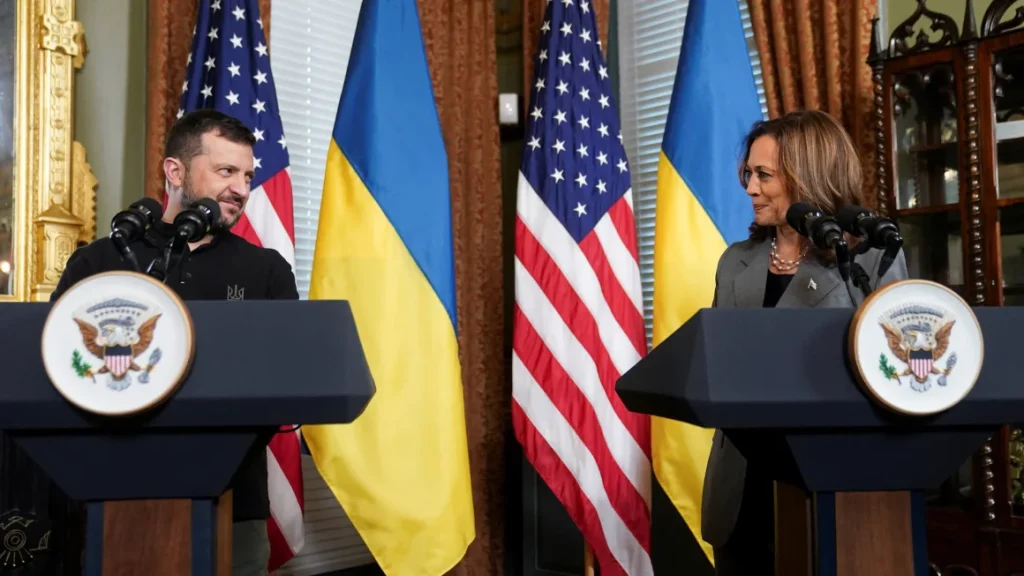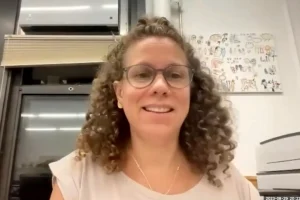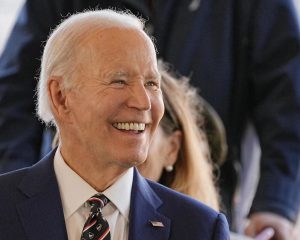Zelensky makes urgent in-person plea to Biden and Harris who highlights her contrasting approach to Trump

Ukrainian President Volodymyr Zelensky’s visit to the White House on Thursday may have been his final chance to convince a receptive American president of his country’s war aims.
And just weeks before a US presidential election that could have a profound impact on his country’s future, Vice President Kamala Harris used the moment to draw a stark contrast between her and former President Donald Trump’s approach to the conflict.
The wide divide was the backdrop to Thursday’s meetings at the White House. During an appearance alongside Zelensky, Harris suggested her Republican opponent would force Ukraine into ceding territory to its Russian invaders, falling in line with demands from President Vladimir Putin.
“In candor, I share with you, Mr. President, there are some in my country who would instead force Ukraine to give up large parts of its sovereign territory, who would demand that Ukraine accept neutrality and would require Ukraine to forego security relationships with other nations,” she said outside her ceremonial office next to the White House. “These proposals are the same of those of Putin, and let us be clear, they are not proposals for peace. Instead, they are proposals for surrender, which is dangerous and unacceptable.”
While Harris did not specify who she was talking about, the implication was clear. And though Zelensky has sought to cultivate relationships with Republicans, including Trump, during his visits to the United States, it was not lost on him or anyone watching that November’s election is providing fresh urgency to his search for a way to position Ukraine for victory.
“History reminds us, and history is so clear in reminding us, the United States cannot and should not isolate ourselves from the rest of the world,” Harris said. “Isolation is not insulation.”
Zelensky was in Washington on Thursday to try and convince the Biden administration his country can still win its war with Russia, so long as the United States and other nations significantly and quickly ramp up their military assistance.
Trump says he and Zelensky will meet
Trump told reporters Thursday that he would be meeting with the Ukrainian president in New York on Friday.
“President Zelensky has asked to meet with me, and I will be meeting with him tomorrow morning at around 9:45 in Trump Tower,” Trump said during remarks at Trump Tower.
Earlier Thursday, Trump cryptically posted on Truth Social what appeared to be a private communication between the Ukrainian deputy ambassador and an aide to the former president asking to pass along a message from Zelensky requesting a meeting. Trump did not indicate in the post whether he would do so.
Zelensky had been expected to depart the United States but was prepared to stay an extra day to facilitate a meeting, a source familiar with his plans said.
The anticipated meeting comes after the Ukrainian president recently told The New Yorker that he believes Trump “doesn’t really know how to stop the war even if he might think he knows how.”
“With this war, oftentimes, the deeper you look at it the less you understand,” Zelensky told the magazine prior to his Washington trip.
On Thursday, Trump told reporters that he looks forward to the planned meeting with Zelensky but disagreed with his assessment, saying, “I believe I will be able to make a deal between President Putin and President Zelensky quite quickly.”
But the former president declined to delve into the specifics of his plan and left things open-ended when asked whether he believes Ukraine should cede territory to Russia as a means of ending the war.
Ahead of Zelensky’s arrival in Washington, President Joe Biden ordered a surge of assistance to Ukraine, directing the Pentagon to allocate all remaining funding already approved by Congress before he leaves office in the hopes of positioning Kyiv for victory no matter the winner of November’s US presidential election.
Speaking to reporters next to Zelensky just before the pair met privately in the Oval Office, Biden said “This will strengthen Ukraine’s position in future negotiations.”
On post-war recovery efforts, Biden said the US and allies “have to support Ukraine on its path to membership to both the EU and to NATO, and to continue to make reforms to counter corruption,” while ensuring the country is able to repel any future Russian attacks.
And he pledged continued US support for recovery and reconstruction efforts in the country, in some cases “using Russian assets as well.”
Biden is usually apt to take his time making decisions about providing Ukraine new capabilities. But with November’s election potentially portending a major change in American approach to the war if Trump were to win, Ukrainian officials — and many American ones — believe there is little time to waste.
Trump has claimed he will be able to “settle” the war upon taking office and has suggested he’ll end US support for Kyiv’s war effort.
“Those cities are gone, they’re gone, and we continue to give billions of dollars to a man who refused to make a deal, Zelensky. There was no deal that he could have made that wouldn’t have been better than the situation you have right now. You have a country that has been obliterated, not possible to be rebuilt,” Trump said during a campaign speech in Mint Hill, North Carolina, on Wednesday.
Comments like those lent new weight to Thursday’s Oval Office talks, according to American and European officials, who have described an imperative to surge assistance to Ukraine while Biden is still in office.
Biden orders surge of assistance
Anxiety over the future of American support has colored many of Zelensky’s visits to Washington. When he visited the White House last year, it was meant in part to apply pressure on Republican congressional leaders to approve billions of dollars in new assistance.
The aid was eventually passed, but support for Ukraine among Trump allies is not high. While Zelensky visited Capitol Hill Thursday, he did not meet Republican House Speaker Mike Johnson.
During his more than hourlong meeting with senators before his visit to the White House, Zelensky made his case for increased US support for his war-weary country while laying out the plan he would later present to Biden. He was emphatic he needs permission to strike deeper into Russia, which many senators on Capitol Hill have supported and something that continues to be a major priority for Ukraine.
Some lawmakers in the meeting said they also lent Zelensky suggestions on how he could be more persuasive with Biden.
Biden said ahead of his meeting with Zelensky that he was directing the Department of Defense “to allocate all of its remaining security assistance funding that has been appropriated for Ukraine by the end of my term in office.” He also said he was approving new long-range weapons, Patriot missiles and the US military will expand training for Ukrainian F-16 pilots, taking on an additional 18 pilots next year.
The US president said he plans to convene Western leaders next month in Germany to coordinate their efforts toward helping Ukraine achieve victory.
Whether that is enough to help defeat Russia remains to be seen. And, at least publicly, Biden has stopped short of granting Ukraine permission to fire Western provided long-range weapons deeper into Russian territory, a line Biden once was loathe to cross but which he’s recently appeared more open to as he has come under growing pressure to relent.
Even if Biden decides to allow the long-range fires, it’s unclear whether the change in policy would be announced publicly.
Biden said he’d decided to provide Ukraine with a Joint Standoff Weapon (JSOW) long-range munition to “enhance Ukraine’s long-range strike capabilities,” though his statement did not specify whether he planned to lift restrictions on firing the long range weapons deep inside Russian territory.
Previewing Zelensky’s visit to the White House a day beforehand, Biden declared on the margins of the United Nations General Assembly his administration was “determined to ensure that Ukraine has what it needs to prevail in fight for survival.”
Zelensky looks to develop Harris relationship
Zelensky’s separate meeting with Harris on Thursday – which took place after the Ukrainian leader wraps up with Biden – signaled his desire to further develop what would be his most important leader-to-leader relationship should she win.
In the weeks since taking the political baton from Biden, Harris and her aides have gone to great lengths to insist that on major matters of foreign policy, there is no daylight between the vice president and the outgoing president.
The ongoing war between Ukraine and Russia is no exception, they say, insisting that Ukraine would continue to have the US’s unwavering support against Russian aggression under a Harris presidency.
The vice president’s face time with Zelensky on Thursday marked their sixth meeting since the war broke out in February of 2022. Just several days prior to the start of Russian attacks in February 2022, the vice president also saw Zelensky at the Munich Security Conference, where the two discussed Russia’s military build-up around Ukraine and the possibility of the start of a war.
In her remarks at the Democratic National Convention last month, Harris was deliberate in taking credit for the US’s response.
“Five days before Russia attacked Ukraine, I met with President Zelensky to warn him about Russia’s plan to invade. I helped mobilize a global response – over 50 countries – to defend against Putin’s aggression,” she said. “And as president, I will stand strong with Ukraine and our NATO allies.”
Advisers to the vice president say Trump’s public statements about the war in Ukraine could not make more clear the starkly different foreign policy worldviews of the vice president and the former president. (Trump appears unlikely to sit down with the Ukrainian leader, despite saying last week they would “probably” meet.)
Harris has insisted that if she were to become president – unlike under Trump’s watch – Ukraine would be able to count on unwavering US support.
Trump’s campaign has been blasting Zelensky over an interview with the New Yorker published Sunday in which Zelensky called vice presidential nominee JD Vance “too radical.”
“His message seems to be that Ukraine must make a sacrifice. This brings us back to the question of the cost and who shoulders it. The idea that the world should end this war at Ukraine’s expense is unacceptable,” Zelensky said in the interview. “For us, these are dangerous signals, coming as they do from a potential Vice-President.”
Trump alluded to the comments in North Carolina on Wednesday.
“The President of Ukraine is in our country. He’s making nasty little aspersions toward your favorite president, me,” he said.
There is quiet recognition even inside the Biden administration that any reassurances Zelensky may receive from Biden and Harris this week on the US’s commitment to supporting Ukraine could all be for naught under a different American president.
At the signing of a new US-Ukraine defense pact on the sidelines of the G7 meeting in Italy in June, Zelensky was asked what contingency plan he might have for precisely such a scenario.
“If the people are with us, any leader will be with us in this struggle for freedom,” Zelensky responded.
This headline and story have been updated with additional developments.


